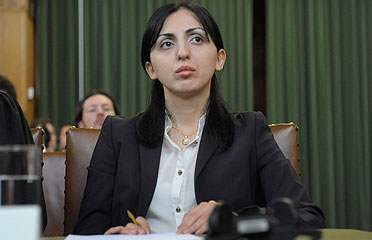| Georgia Says ICJ Ruling Leaves Room for Further Legal Actions Against Russia |
| Civil Georgia, Tbilisi / 1 Apr.'11 / 15:55 |

The Hague-based International Court of Justice (ICJ) April 1 ruling is not putting an end to Georgia’s case against Russia and Tbilisi will seek to resolve “technical” problems in order to pave the way for consideration of the case on its merit by the Court, the Georgian government said.
“This case is not over with today’s hearing,” Tina Burjaliani, the deputy justice minister, who was representing the Georgian government at the hearings, said in a televised remarks from The Hague. “We are not going to stop our pursuit of justice because of coming upon a simple obstacle. We believe that this dispute should be resolved through international legal means and Russia should be held responsible for its illegal acts.”
In a written statement released shortly after the ruling was announced the Georgian government said that the ICJ’s decision “leaves open the possibility that once formal negotiations have been exhausted, it will have jurisdiction over the case.”
ICJ ruled on April 1 that “it has no jurisdiction to entertain the application filed by Georgia on the 12th of August, 2008” in which Georgia claimed that Russia violated its obligations under the 1965 International Convention on the Elimination of All Forms of Racial Discrimination (CERD) during three distinct phases of its interventions in South Ossetia and Abkhazia in the period from 1990 to August 2008.
The Court took this decision after upholding an argument by Moscow, which claimed that Georgia neither attempted to negotiate specifically CERD-related matters with the Russian Federation nor used other mode of dispute resolution contained in Article 22 before referring the case directly to ICJ on August 12, 2008.
The Court, however, rejected Russia’s another argument based on which Moscow was arguing that ICJ had no jurisdiction over the case. Russia argued that there was “no dispute” between Tbilisi and Moscow over racial discrimination against the ethnic Georgian population of Abkhazia and South Ossetia and that Tbilisi had never formally raised the issue directly with Moscow.
Rejection of Russia’s this argument by the Court was applauded by the Georgian government, which said that by doing so the Court in fact left the opportunity for Tbilisi to further pursue the case once resolving procedural issues related with the Article 22.
“We welcome the Court’s rejection of a core argument put forward by the Russian Federation that no dispute exists on the grounds of ethnic discrimination and ethnic cleansing,” Tina Burjaliani, the Georgian deputy justice minister said.
“The court has simply ruled that – due to a procedural technicality whereby the court requires further negotiations to take place between the two sides - the proceedings will not immediately lead to further consideration of the merits of the case against Russia. However, the court has left open the possibility that the case can proceed once the formal conditions for the exercise of jurisdiction by the Court, as required by the 1965 Convention, have been met,” she said.
